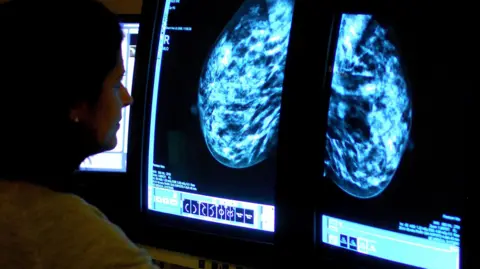New funding for breast cancer recurrence research
 Rui Vieira/PA Wire
Rui Vieira/PA WireScientists researching why some breast cancers can return after years of successful treatment and form incurable secondary tumours have received extra funding to continue their work.
The Breast Cancer Now research team at the University of Sheffield has been given £500,000 by the Patricia Swannell appeal, an organisation set up to raise awareness of secondary breast cancer.
The money will be used to investigate whether gene therapy could stop dormant cancer cells from waking up.
Professor Penelope Ottewell from the team said it could offer secondary cancer patients "hope for better long-term survival and quality of life."
'Better treatments'
Patricia Swannell was diagnosed with primary breast cancer in 2007. After a mastectomy, chemotherapy, and radiotherapy, she was given the all-clear five years later.
In 2019, she began to experience pain in her hips and joints, and by 2021, she was diagnosed with secondary breast cancer - it had spread to her bones, liver, and abdomen.
Most breast cancers do not come back after treatment, but in some cases, cancer cells can remain dormant and undetectable in the body, according to a spokesperson for the research project.
Years later, they can wake up and begin to circulate in the bloodstream, then develop tumours in other organs which cannot be cured, the spokesperson said.
During the last 18 months of her life, Ms Swannell began fundraising for Breast Cancer Now, and the appeal has since raised more than £1.4m.
She died in 2023.
Her husband, Robert Swannell, said they had hoped to make steps towards "earlier detection, better treatments and, ultimately, a cure".
"It is great to see the funds now allocated and the work started," he said.
"Patricia would be so delighted that a seed has been firmly planted."
The potential treatment being researched in Sheffield involves modifying the cells in bones, allowing them to create a type of protein which could stop cancer from growing in them.
Dr Simon Vincent, director of research, support and influencing at Breast Cancer Now, thanked supporters of the Patricia Swannell appeal for their "incredibly generous" contributions.
"Our hope is that the findings from this research will help ensure people who have been treated for breast cancer can live happy healthy lives without fear of the disease coming back," he said.
Listen to highlights from South Yorkshire on BBC Sounds, catch up with the latest episode of Look North or tell us a story you think we should be covering here.
